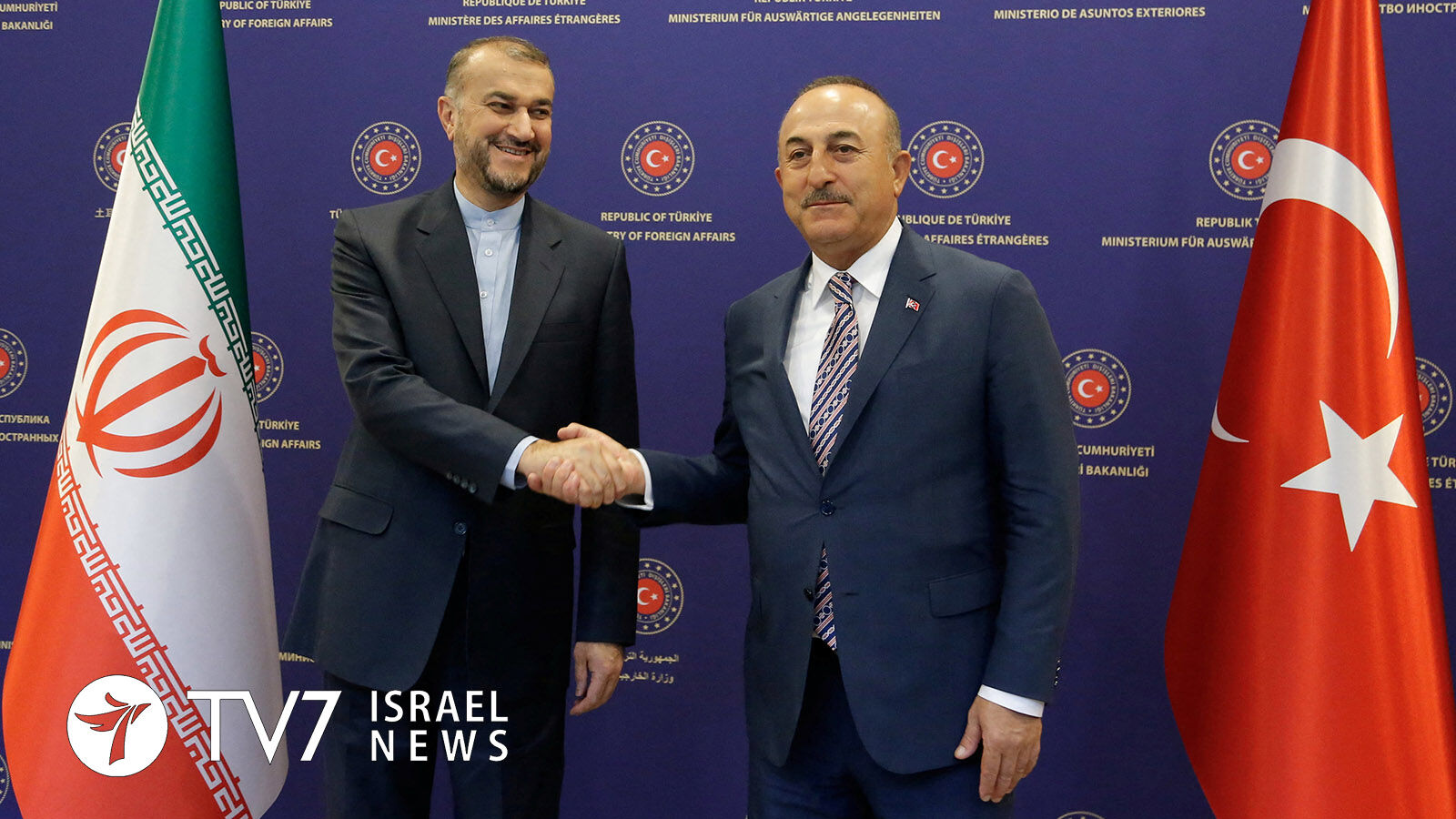The two countries reaffirmed their shared commitment to the Palestinians while working to repair strained ties.
By Erin Viner
Turkish Foreign Minister Mevlüt Çavuşoğlu hosted his Iranian counterpart Hossein Amir-Abdollahian in Ankara to discuss bilateral relations, which have recently sharply deteriorated.
The Islamic Republic’s top diplomat, who had cancelled of two previously scheduled trips to the Turkish capital, announced that efforts are underway to draft a long-term comprehensive cooperative agreement between the two countries to bolster ties in a variety of sectors.
The Israeli-Palestinian conflict appeared to top discussion on regional matters.
The two foreign ministers also stressed alignment with the Palestinians – despite Turkey’s ongoing attempts to repair a diplomatic rift with Israel.
“Turkey’s position will never change, as we reiterate every time,” declared Çavuşoğlu while standing alongside Abdollahian at a joint press conference, declaring that “Palestine and al-Quds (Arabic for the “Holy City” referring to Jerusalem) is our common cause.”
“We will continue to be in cooperation” when it comes to “defending Palestine and al-Quds,” he vowed.
Highlighting that “when it comes to the Palestinian cause, we all have always known the perspective of Turkey. We are sure of that Turkey has never given up on the cause of Al-Quds and Palestine,” Iranian Minister Abdollahian went on to attack his nation’s arch-foe Israel.
Stating that he and his Turkish counterpart discussed the mutual belief “that the Zionists bring dissent and unrest wherever they go,” he then proclaimed that “the Zionist regime is the #1 Enemy of the whole (of) humanity.”
The talks also focused on the self-interests of their nations in the Syrian Civil War. Iran is vying for control by means of its Islamic Revolutionary Guards Corps (IRGC) Quds Force and proxy militias, while Turkey continues to wage battle against Kurdish forces it considers as terrorists. Abdollahian said that Iran “understands the security concerns of the Turkish side” over Syria that should be addressed “fully and permanently,”
For the past several years, Israel has acknowledged mounting hundreds of attacks on Iranian-linked targets in Syria where the Islamic Republic’s forces and proxy terror groups including Lebanon’s Hezbollah have become entrenched in deployments aimed at attacking Israel while assisting President Bashar al-Assad battle insurgents in the Syrian Civil War which erupted in 2011.
While the Jewish State rarely confirms such missions, the country’s political and defense leaders have repeatedly stated that Iran’s presence just over the northern frontier will not be tolerated.
Abdollahian and Çavuşoğlu also discussed Israel’s advisory for its citizens against travel to Istanbul at the risk of being targeted by Iranian agents.
After Çavuşoğlu said: “We must continue to work together because terrorism is our common enemy,” Abdollahian stated that his country is aware of Turkey’s security concerns, adding that Iran and Turkey’s security were indivisible. “We want nothing but good for the region and Turkey,” he added.
Abdollahian later held talks with Turkish President Recep Tayyip Erdoğan, when they again reaffirmed the importance of bolstering bilateral ties through “comprehensive and sustainable cooperation and boosting consultations over regional and international issues of interest.”
During a visit to Turkey last week, Israeli Designated Interim Premier Minister Yair Lapid thanked authorities for foiling attacks against Israeli citizens in Istanbul and said the effort is still ongoing.
“In recent weeks, the lives of Israeli citizens have been saved thanks to security and diplomatic cooperation between Israel and Turkey,” Lapid said. “We are confident that Turkey knows how to respond to the Iranians on this matter.”
Turkey announced the arrest of a cell, comprised of five Iranians and two Turks, that was planning to attack the former Israeli ambassador, his wife and other Israelis. Standing next to Jerusalem’s top diplomat, Çavuşoğlu said Turkey “cannot permit these kinds of incidents taking place in our country,” adding that “We have delivered the necessary messages.”
Ankara and Jerusalem have begun work to cool years of disputes, primarily over Israel’s presence on the West Bank as well as Turkish support for the Islamist Hamas terror group that controls Gaza and Ankara’s ties to Tehran..
The two countries expelled ambassadors in 2018 and have often traded barbs over the Israeli-Palestinian conflict. Energy has emerged as a key area for potential cooperation as they strive to mend their relations.
“We will continue the high-level mutual visits in the short term,” said Çavuşoğlu, who visited Israel last month to encourage expanded economic cooperation. It was the first such visit by a senior Turkish official in 15 years.
Through the years of acrimony, Turkey and Israel have maintained trade, which stood at $6.7 billion in 2021, up from $5 billion in 2019 and 2020, according to official data.
